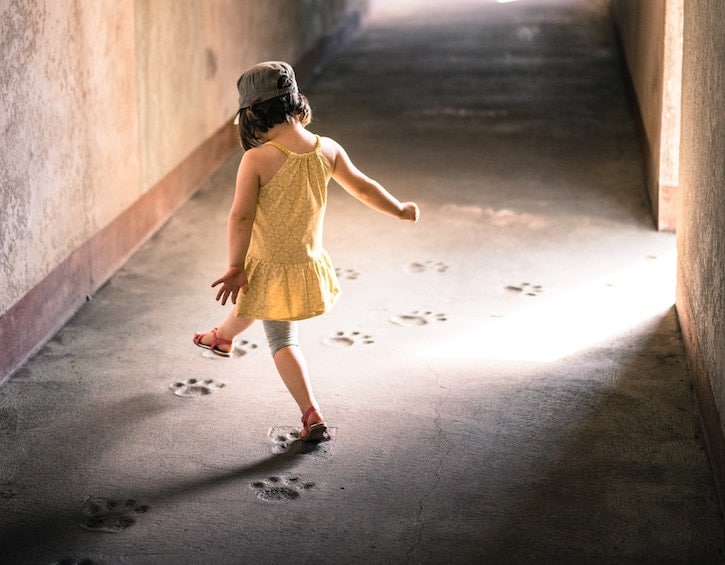
Are there ghosts in your nursery? Here are five ways your childhood might affect your parenting style.
Remember when you were little and you’d say “When I’m a parent I’m never going to do that!” For sure, a few of us in the Sassy Mama office said something similar in the heat of the moment, but whether we realise it or not, how we treat our kids, show love, encourage them, discipline them and react to their behaviour is all tied to our childhood and how our own parents parented us.
In fact, the style of parenting you use is linked to how you were raised. Psychoanalyst and pioneer in infant psychiatry, Selma Fraiberg described this phenomenon as having, “Ghosts in the Nursery.” Read on to find five common traits from your childhood that might affect the way you raise your little people, along with action points on how you can move forward.
Read more: Respectful Mom Parenting Tips: The Importance of Acknowledging Feelings

Spooky spirits or Casper the friendly ghost?
Fraiberg stated that in every nursery (sometimes at the dinner table and playground too!) there are ghosts. The ghosts represent the voices of the past (our mamas or papas) and signify that we are likely to unconsciously repeat our parents’ behaviour with our own children.
As a child, our primary caregivers are our only models of adulthood and of the world itself. The bonds we develop with them are essential in forming our cognitive, social and emotional development. Parenting gives us the opportunity to reflect on our own early experiences. I am seeing an increasing number of mums and dads who are concerned about creating the same experiences for their own children (especially when unpleasant) but are unsure how not to copy their parents.
It’s not about being critical or judgemental of our own parents, after all – they raised you and have themselves been through what you are currently facing! Think of it more as an understanding of their patterns and methods while processing our own childhood, so that we can move forward and better ourselves in providing a solid foundation for our kids.
History is not destiny
Attachment research tells us that the biggest predictor of how we will be as parents is how much we’ve been able to make sense of our own past. This means we are not doomed to repeat the mistakes of our parents.
This is great news for making desired changes. With a little bit of understanding and advice, we are better able to relate to our children and provide them with the nurturing they need. We can begin to understand why our kids trigger us and recognise that our “instinctive” reactions to these triggers is not always representative of how we want to parent. Over time, we can begin to change these reactions.

The premise is simple: those who remember the past don’t seem to repeat it and those that don’t remember, do. Based on that, let’s take a look at the five triggers for history repeating itself:
1. Imitating
Have you ever had that moment when you’re trying to instil some form of discipline in your child and you suddenly realise you have become your own mama (or papa)? For some people, this moment of recognising our parents within ourselves can be comforting or even humorous, but for others, it can be terrifying.
Neuroscience states that when we love, the neurons in our brain begin to mimic those of the person that we are involved with. This happens with parents and primary caregivers too. As early as infancy, babies try to imitate our facial gestures such as sticking out their tongues or opening their mouths wide. Imitation is a crucial tool for learning a new behaviour, and as children, we learn from what our parents say and do. We may have learned plenty of good things from our parents, but we may have also been on the receiving end of some disruptive behaviour. When we fail to recognise these behaviours, we can hurt our own children by repeating them.
Action Point: Try asking yourself these questions:
- What did you like about the way you were parented?
- What would you not like to repeat with your own child?
2. Overcompensating
Overcompensating is seen as taking excessive measures to be different from our parents. We have the best intentions of trying to do things differently, but often we inadvertently go overboard. An example of this is if we had parents who were incredibly strict and overbearing, we may compensate by giving our child too much freedom and encouraging them to do or try anything. While we think we’re being the cool, undemanding parent, our children may experience this as disinterest and long for some clear direction from us.
When we go out of our way to intentionally raise our children in the complete opposite way to how we were raised, we are still changing our behaviour based on our own history. We are reacting to the way we were raised rather than taking the time to analyse and learn from it.
Action points: Ask yourself these questions:
- Am I trying to make up for a past mistake of my own or my parents by going overboard in a particular way?
- Is my action really doing my child a favour, or is it a disservice?
3. Projecting
As parents, we generally want nothing more than to see our children happy, healthy and successful in their own way (as did our parents while bringing us up!). Unfortunately, more often than not, feelings from our own childhood can get in the way of allowing our kids to live their own lives. Even the most loving parents can project fears, disappointments, prejudices and expectations that they felt when young onto their kids without even knowing it. Invariably, this puts pressure on our children to either be just like us, or to excel in ways in which we weren’t able to. This can lead to kids adopting identities that might not actually be their own.
Action points: Ask yourself these questions:
- Have you adopted your own parents’ projections into your identity?
- Was there anything about your parents’ approach to raising you that you don’t want to recreate with your child?
Read more: Respectful Mom Parenting Tips: The Inherent Goodness of Children

4. Emotional triggers
At some point in everyone’s childhood, we feel angry or hurt, and so overwhelmed that our brain isn’t able to process the experience (which usually happens by stripping away associated emotions and incorporating them into a neural network with related memories). The memory, therefore, is stored unprocessed with all the emotions that we felt at the time the event occurred.
So, when our children do something that triggers these overwhelming emotions, we feel transported back into the old, hurtful situation and we react by acting out and possibly “losing it” with them.
Action points:
- Try and think of a recent event where you had an intense or seemingly exaggerated reaction to your child. What was your general feeling in the split second before reacting?
- See if you can identify other moments in your childhood where you experienced this feeling. Looking back at the feelings you experienced in childhood could inform the current situation and why you were triggered by your child.
- Respond instead of react.
5. Listening to your critical inner voice
Most of us are all too familiar with the worry and self-doubt that seems to surface every time we decide to try something new or challenge ourselves. Parenting is no different. Our insecurities and self-criticism skyrocket when we become parents because having our own children reminds us of when and where we first developed these critical self-perceptions. Often, these come from primary caregivers and early life experiences that are internalised.
Our words and language have a much more powerful effect than we may imagine. Even when we believe our kids aren’t listening, they’re absorbing the words, tone of voice, gestures, and messages we give ourselves. When we are judgmental and critical towards ourselves, our children pick up on our negative attitudes and often internalise this themselves.
Action Point: Try asking yourself these questions:
- What are you telling yourself about how you are as a parent?
- Where might these attitudes come from?
- From an objective “looking at the facts” standpoint, how true are these messages you are giving yourself?
Awareness is key
At the end of the day, awareness is key. Knowing how your past influences your parenting is half the battle. As your journey as a parent unfolds, remain curious and compassionate with yourself, hold on to what you like and make a conscious effort to let go of what no longer serves you.
Read more: ‘Mama, why don’t you laugh?’: The Emotional Labour of Motherhood






 View All
View All




 View All
View All









 View All
View All





